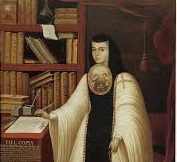Sor Juana Inés de la Cruz

November 23, 2020
While still a controversial subject, feminism has become an extremely relevant topic in recent decades. Today, females of all ages rally in harmony, fighting for women’s rights and gender equality. This was most certainly not always the case, especially in the seventeenth century. Men had the last word, and, even if women opposed, they did not collaborate in large enough numbers to make their voices heard. However, there was one voice that men could not drown out, one which overcame numerous obstacles and empowered millions of women. This voice belonged to none other than Sor Juana Inés de la Cruz.
Juana Ramirez de Asbaje was born in New Spain, or modern-day Mexico, in 1651. Even as a young child, she showed signs of extraordinary intelligence along with an impeccable passion for learning. The combined forces of these two skills made Juana virtually unstoppable.
Up until her young adulthood, Inés continued to succeed in her academic journey. Juana was an extremely talented poet and religious philosopher and she even taught herself Latin. The most impressive part of it all was that Juana was completely self-taught in all of her skills.
Juana knew that her liberty as a non-married female would not last long once she turned eighteen. When numerous men proposed to her, she knew that the only way to maintain her freedom was to become a nun. Juana’s new title became Sor (Sister) Juana Inés de la Cruz and she spent most of her days in the Convent of Santa Paula.
As a nun, she had plenty of time to expand upon her studies in literature. Sor Juana wrote many poetry pieces that criticized the hypocritical nature of men. Her actions were rather rebellious and unparalleled for her time, but she refused to quit her protests. Sor Juana continued to support female education and comment on the fairly obvious double standards that targeted women at the time.
While Sor Juana maintained a steady shield against all of her hostile critics, the pressure only grew until she was forced to stop publishing her writing. About one year later, in April of 1695, Sor Juana Inés de la Cruz passed away after taking care of her fellow nuns when a sickness broke out. Although her life was cut short, Inés left an unforgettable impression upon society, both then and now. She remains a symbol of feminine power, not only in Mexico, but all across the globe. Her memory will forever be remembered in the hearts of all those she inspired. Long live Sor Juana Inés de la Cruz!
Sources:
https://www.britannica.com/biography/Sor-Juana-Ines-de-la-Cruz http://womenatthecenter.nyhistory.org/juana-ines-de-la-cruz-feminist-poet-of-new-spain/
